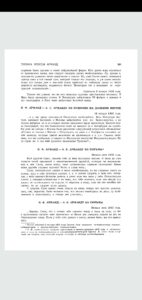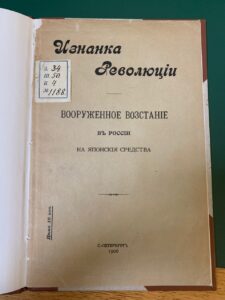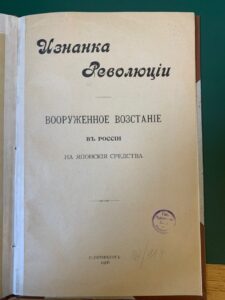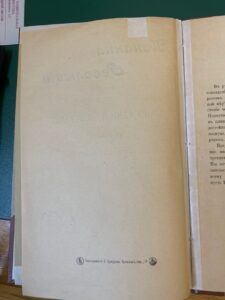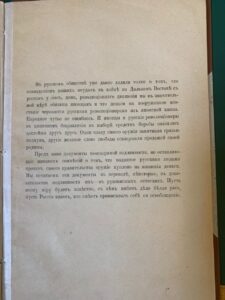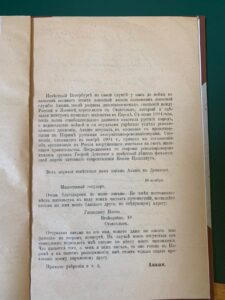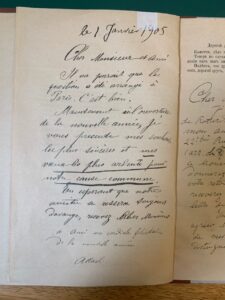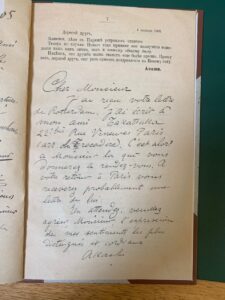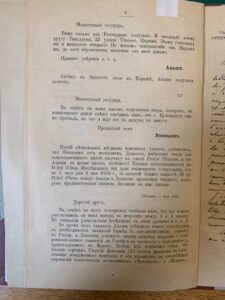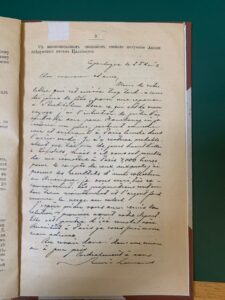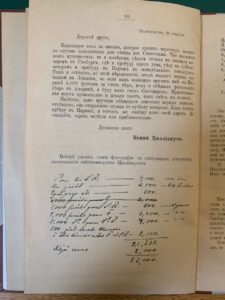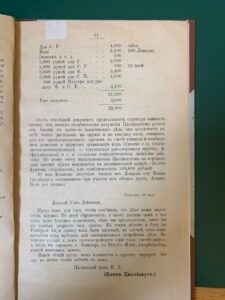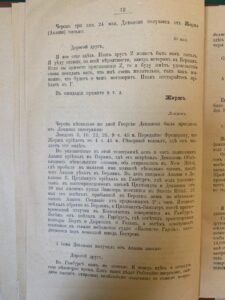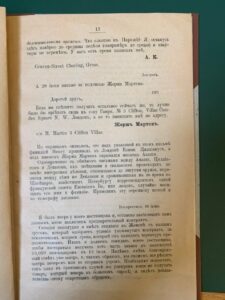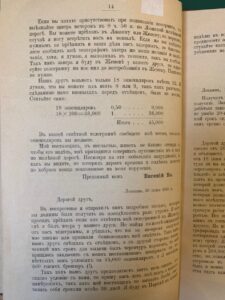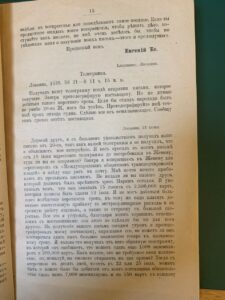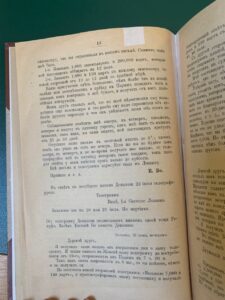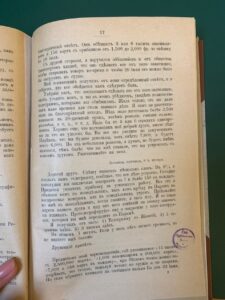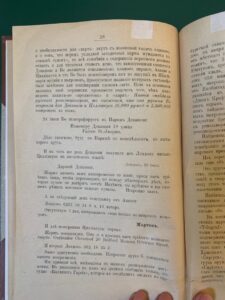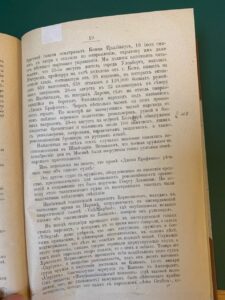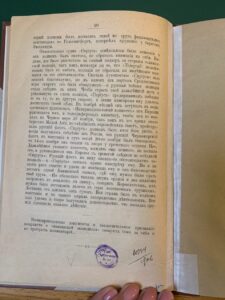The Hysterical side as opposed to the Factual side of The 1905 “Russian Revolution”
Istanbul Institute of
Russian and Sovietic Studies

The mass gathering scene of the political action film by James McTeigue, V for Vendetta (2005) reminds us the October (1928) of Sergei Eisenstein! However, there is a slight but crucial difference: the crowd in the film heads towards the Parliament.
Not to the Buckingham Palace! …
And, neither any audience nor any cocky film analyst have so far questioned what could have been going on in the Buckingham Palace during those moments of blowing the Parliament up. The film never shows anything related to the Royal Order. It successfully makes the audiences to forget the fact that there actually exists a kind of centralized power in Britain.
Why the documents we display here are important today?
In order to define the importance of historical documents we present below, let’s start with a very obvious and still unnoticed weirdness of the political action film by James McTeigue, V for Vendetta (2005). The film of McTeigue led to a big excitement and political inspirations among the youngsters and their emotional involvement into “street politics” which preceded the Occupy movements and then the Arab Spring. The film narrated the oppressed majority as a collection of minorities that consists of the colored (black and brown) immigrants, Muslims, Jews, gays, lesbians, namely the non-WASP people of all kinds.
Nowadays, 15 years after the release of this film, it is seen that this description of the oppressed/revolutionary phenotype was in line with the romantic socialist-leftist characterisation of the same anti-WASP discourse that is coined with a more popular term — the underprivileged people.
Nevertheless, the weirdness in the plot was the following:
The crowd (consisting of various forms and levels of underprivileged people) takes action and they finally gather in front of the Houses of Parliament (the governmental building, where the theater of democracy within the British parliamentarian monarchy is being played). This mass gathering scene reminds us the October (1928) of Sergei Eisenstein! However, there is a slight but crucial difference: the crowd in V for Vendetta heads towards the Parliament — not to the Buckingham Palace! … And, neither any audience nor any film critics “doyen” have so far questioned what could have been going on in the Buckingham Palace which is located in just nine hundred meters away, during those moments of blowing the Parliament building up: Did the royal family already quit England? or expelled? Or do they watch the show in their TV? The film never shows anything related to the Royal Order and successfully makes audiences to forget the fact that there actually exists a rule of a monarchic dynasty, that is, a kind of centralized power, in Britain.
The full intellectual-artistry circle behind the director James McTeigue, while seemingly attacking to the Nordic-White supremacy (WASP+male notions), the Wachowskis, Alan Moore, David Lloyd and the others who engineered the film, apparently didn’t dare to bring any nuisance about the sacracy of the English Royal Order onto the public consciousness.
The sacracy (of a centralist Power) is the critical term in our investigation here. It needs more reflection to evaluate its function. By meaning the sacracy of the centralist power, we don’t necessarily refer to a theological-monarchic regime as in the case of the Ottoman Chalifate. The centralist/autocratic power can fully be secular, while its effectiveness still depends on its sacracy, in the sense that it represents an ethical consensus, a social contract agency, guaranteeing the duties, obligations and limits in economic and cultural lives that conjunct the urban and the rural.
The interview of Andrew Borzenko with historian Mikhail Davydov underlined this phenomenon: the Monarch was an utterly sacred figure for the peasantry guaranteeing the redistribution ethics, in a way, an ethical agency for the “symbiotic integrity” between the center and the countryside. Thus, the effects of the abdication of the Tsar (by the Kerensky government) led to a moral vacuum during the Bolshevik Revolution and the Civil War. The consequences were twofold: it granted the Bolshevik gang the initiative for looting (“the war communism”) and it urged the peasantry to hide the harvest and/or to cease to produce.
This inspiring interview was translated by our colleagues Olga Gradinaru and Nicoleta Marinescu into English and published by the Istanbul Institute of Russian and Sovietic Studies (IIRSS), two years ago.
Here we propose one more evaluation — a Zizekian formula — to understand the function of this missed sacred entity in question. What if the functioning of this entity depends merely on its denial in real life as it is in the film V for Vendetta? The film skips the Royalty for attributing a political mightiness to the public, in the same way as in the actual British “democracy” which is presumed to function in perfection (as opposed to other “defected” democracies elsewhere, the autocratic regimes and so on). However one should ask, what if this perception of democratic “perfection” depends on the denial of this entity (centralist, autocratic power), which in return, also grants to the Monarch its very (im—)potent functioning? Here we find the three Lacanian categories: the Real, as the undefinable monarch power; the symbolic, that is the “volleyball” democracy displayed in the Houses of Parliament, and the imaginary, the fancy conception of democratic mightiness in the public (on the street) … Thus the dis- or mis-appearing Real, the Royal Power, is not simply a political agency in the current politics, but more than that, it is a constitutive entity which runs the political apparatus. It enables the mediocre British citizen to conceptualize, define and struggle for his or her “rights”.
Mutatis mutandis the annoying question why the Western, namely the Atlanticist and the anti-WASP stance (represented by a segment of “socialist” intelligencia) applaud the Russian Revolutions (1905, 1917…) more than the Russians themselves, constitutes a large part of our Institute‘s research programs. Here again we reveal an unspoken, deep-cut historical shame of the revolutionary Left: it hypocritely attacks to the sacred in Russia (and elsewhere) while preserving its own sacred intact. It abrogates the conceptual means of the poorest and the most exploited strata of people for their engagement into politics while hiding its traison behind its high socialist-humanitarian discourses intermingled with theoretical concoctions.
Inessa Armand: the hysterical denial
Let’s start with a letter of Inessa Armand to her husband, Alexander Armand, in the wake of the 1905 Uprises. Inessa Armand is as known is the mistress of Lenin. But this fact was revealed by historians quite recently: by the end of the 60s, some American historians began to focus on Inessa Armand. Then the Time magazine headlined this mistress issue in the front page. Time’s publication ignited an international crisis between the US and the USSR to such an extend that the USSR called their Ambassador back.
Following this incident, the Inessa Armand issue had slept for about two decades. During the Perestroika and in the 90’s Inessa Armand was brought back into agenda. Although some good bios were written in the West and also in Russia, none of these works investigated the financial sources of this woman. Neither her contacts during their Zurich datings with Lenin, nor her personal affairs with various businessmen, statesmen, as well as with her own wealthy family members were regarded as possible sources for money and the cash flow aspect of their advent has always been kept into darkness.
The letter related to our topic — that is, the 1905 Uprises — was written in 14 January 1905. Inessa Armand wrote this letter while she was living with her lover, brother-in-law, Vladimir Armand. Her addressee, her husband Alexander Armand was at that time temporarily in travelling to Vladivostok. We don’t know for what business had Alexander Armand to had for his trip to Vladivostok in the mid of the Russo-Japanese War. To our knowledge, the published part of the letters of Inessa Armand doesn’t give a clue for answering to this question.
The letter in question tells roughly the following:
“…. There are strikes and unrest in Piter, in Moscow, and almost everywhere in the country. It looks like a revolution! By the way, there is a rumor in the public that these strikes were organised by the Japanese money. The main thing is that these rumors were spread by some Latin agent. How ridiculous! Have you been satisfied with Trepov’s appointment?…. “
The wording of Inessa Armand that histerically denies the Japanese support is especially worth to get focused on:
At first glance, it seems that she categorically rejects the allegations that the Uprises were being organised by the Japanese money. But why did she need to stress on denying these allegations (i.e. “rumors” in the public) that she did not use to believe in? And why did she need to emphasize her “denial” to her husband who was then 8000km away from home — to her husband who was there for some unknown business? And one should even ask, in what respect should this “denial” of her be interesting or relevant for her husband Alexander Armand, who was a wealthy and influential merchant and a manufacturer? Who is this “Trepov” with whom her husband was supposed to meet? Was she speaking in this letter, to a third person, to an “Other” (besides her husband), presuming that the letter would be check by the Russian police, or else?
Hereunder we copy and paste the exact Russian text of the letter as it was published in Novy Mir, for our Russian speaker readers:
И. Ф. АРМАНД – А. Е. АРМАНДУ ИЗ ПУШКИНО НА ДАЛЬНИЙ ВОСТОК
14 января 1905 года .
… А у нас вроде революция! Оживление необычайное. Весь Петербург бастует, начинает бастовать и Москва; забастовало уже все Замос1шоречье, и не толыrо фабрики, но и некоторые мелкие заведения вроде прачечных. Бастует много типографий, так что большинство газет не выходит (а в Петербурге ни одной). На днях на улицах в Москве было расклеено след:ующее] остроумное объявление: «Стачки не только в Моснве и Петербурге, но даже и в Вестфалии являются делом японцев, которые тратят миллионы на провокацию и т. д.:>>. Главное написано, что это сообщение от какого-то Латинского агентс•гва! Несуществующего. Ну не глупо ли! А как тебе нравится назначение Трепова?1…
Source: Novy Mir, 1970, no. 6, p:203
You, our valuable reader, can download the full Issue no 6 of 1970 Novy Mir in pdf format by clicking on the page 203, hereunder:
This issue of Novy Mir was devoted to Inessa Armand’s letters. It is particularly interesting to remind the date of the issue, that is 1970, which is shortly after that the Time magazine had made the Inessa-Lenin affair public: The technical term we use to define such operations is “clinching” — a term that we borrow from boxing: in order to avoid the fabricated leaders’, heroes’, heroines’, celebrities’ scurvy features to become current in the public, such personages are promptly and excessively promoted through their slightly different aspects and with a romanticizing rhetoric.
It is also important to note that the letters of Inessa Armand were carefully inspected and — most probably — censored by one of her daughters, Inna Alexandrovna Armand, who used to work at the Institute of Marxism-Leninism (https://russian7.ru/post/inessa-armand-chto-stalo-s-detmi-lyubov/. Therefore we cannot see the full versions of most of the letters in Novy Mir — including the one in question. It is also worth to underline that the kids of Inessa Armand adopted a fully reconciliative political position — a patriotic stance — while the Armand family tradition still remained “elite” in the new regime. The kids, they both improved their military and scientific careers by compromising with the re-centralized state after 1928 (http://www.bolshoyvopros.ru/questions/2553969-chto-izvestno-o-detjah-inessy-armand-kak-slozhilas-ih-sudba.html).
Alexey Shmakov: the emphatical factual
Following the hysterical denial above, we will present the emphatical factual below.
During the 1905 Riots and the simultaneously the ongoing Russo-Japanese War, the Russian imperial intelligence, Okhrana, managed to penetrate into the network of weapon smuggling from Switzerland to Russia. The Russian Police deciphered the letter and telegram correspondences between the Japanese military attaché colonel Akashi who was at that time based in Stockholm with middle men circulating through Germany, France, Holland and Switzerland. It is particularly noticeable that among the team many of them had finally gathered in London.
The district attorney Alexey Semyonovich Shmakov (1852-1916) collected and published these correspondences obtained by Okhrana, in 1906, in an unnamed pamphlet.
This pamphlet had been discovered by the relentless work of our Director AliPolaT and found by the head of our “Piter Research Team” (the Chief of our colleagues localized in Saint Petersburg) Nadezhda Stephanenko, at Saint Petersburg State Library.
Our Istanbul Institute of Russian and Sovietic Studies (IIRSS), to our knowledge, is the first translator of this rare document into English.
This Pamphlet constituted actually a part of a larger book of Alexey Semyonovich Shmakov. However (again to our knowledge), the full book has never been printed or — even if printed — never been made public, so far. The reasons why just a part of it — the pamphlet we present below — was published without mentioning the author’s name and why the full book was kept into darkness can be the followings:
- 1905 was a period of frequent political assassinations. The fear of being assassinated may have led Shmakov (or the publisher) to hide his name.
- Shmakov was a hardcore anti-Semit and consequently a bulky part of his manuscript consisted of a harsh and repeated hate speech against Judaism and Jews. Therefore the imperial state apparatus behind him might have cut the large part of the book out, while making just its essential informative parts public.
- The anti-Semitism of Shmakov also explains why his name and his work were kept undercovered for so long besides the Western-Socialist over-romanticizing of 1905 Uprises: anyone referring to him could have promptly been accused for being anti-Semite. Plebs’ minds don’t operate by ideas but by opinions on personages. Only philosophers’ minds are able to abstract the ideas from their subjects (from the personages as the bearers of ideas). Therefore any critical discourse that could have been developed against the romanticizing of 1905 by referring to the name “Shmakov” would have easily been dimmed out.
Hereunder we present our readers the English translation of the Pamphlet of Shmakov — with special gratitude to Ekaterina Sazhina for her translation:
The Reverse Side of the Russian Revolution of 1905
The Armed Uprising Fabricated by the Japanese Money
Saint Petersburg, 1906
The Printhouse of AS Suvorin
In Russian society, there has been the rumors for a long time addressing to the coincidence of our (Russian) failures in the War in the Far East with the growth of the revolutionary movement and that the armed rebellion and the Russian revolutionaries were financed by the Japanese State treasury… The common intuition was not mistaken. The Russian revolutionaries and the Japanese, in their cynical indifference in the choice of means and methods for warfare, they turned out to be worthy to each other. While some have stained the glory of their weapons with the mud of bribery, the others have defiled the great word of freedom by selling (betraying) their motherland. We provide in the booklet the indisputable authenticity of the documents leaving no doubt that the weapons in the hands of the Russian people raised against their government were bought with the Japanese money. We reveal these documents in translation, and for some, to show the proof of their authenticity, we also show them in their handwritten form. Let it be known to the whole world who the real enemy of the white race is and let Russia to know the real face of them who propagate liberation.
A well-known man in St Petersburg who was on duty as military agent of Japanese mission, before the War, whose name is Akashi, right after the diplomatic relations between Russia and Japan were broken, he moved to Stockholm. Then Stockholm became the center of all Japanese spy activities in Europe. Since 1904, when Russian People were involved into revolutionary activities, the discontent about War failures boosted these revolutionary activities. During this year when all these were happening, Akashi started correspondences with the Russian revolutionaries in exile in Paris. These correspondences began in 1904 and led to an agreement to organize a revolutionary uprise in Russia with the Japanese money. A Georgian, Georgiy Dekanozy, was assigned as the middle man, within the revolutionaries’ side. Georgiy Dekanozy was also the perpetrator of the Finnish Resistance Movement of Konni Zilliacus.
Hereunder, as far as we know, the first letter dispatched from Akashi to Dekanozy:
18 November
Dear Sir
I am very grateful to you for your letter. As I don’t have a permanent address, as I often travel, I kindly ask you to send letters to my close friend in the following address:
Mr Nagao
Brahegatan, 18
StockholmWhile sending letters to him, please not even mention my name on the outer envelope. If I will be away, he will immediately forward it to my current address. About what I wrote you previously, everything is ready and at your disposal in Paris. I should just give the order to my French friend.
Truely, and so on
Akashi
—x— 1 January 1905
Dear Friend
It seems that things go excellent in Paris.
Meanwhile, I celebrate your new year with best wishes to you and to our common endeavor.
I hope that our friendship will improve. Once again, dear friend, I kindly ask you to accept my kind wishes for the new year.
Akashi
Dear Sir
I have got your letter from Rotterdam. I have sent a letter to my friend Takadzuka, 22 Street Vineuse, Paris. Please take an appointment and meet with him. When you return from Paris, probably you will get a letter from him.
Best regards and so on
Akashi
Then Akashi, while he was in Paris, got a notification:
2/2Dear Sir
I am answering to your letter which I have got yesterday evening, when I came back home and I am in hurry to tell you that Mr Zilliacus didn’t come yet. But I am waiting for his arrival at any moment.
Truly yours
Empilov
After some months of research, we could reveal that Empilov was the code name of Dekanozy and that Dekanozy has rented a flat in Paris, in the address Street Pierre Charron. Akashi, when he traveled to Paris, he stayed in Hotel D’Iena. These researches provided us the information that Akashi and Dekanozy met on 2 May 1905 at 3pm in the room number 20 in the Hotel D’Iena. Before that meeting Dekanozy had sent to Akashi a notification:
Paris, 1 May 1905Dear Friend
Following your telegram, I report you that you can rely on me tomorrow, on Tuesday, between 3 and 4pm. Eagerly waiting to talk to you and so on.
During that appointment, Akashi urged his interlocutor that it was necessary to fight more active against the autocratic rule in Russia. At the same moment Dekanozy reported to his supervisor the details about how the revolutionary activities were proceeding in Russia, in particular about the unrest in Crimea. Their conversation ended at that point and Akashi transferred to Dekanozy 125,000 Francs for him to organize an armed uprising and both of them made a deal to continue their future correspondence with the codenames “Friedrich” and “George”.
At the same time when they made this meeting Akashi got a letter from Zilliacus:
Kopenhagen, 25 AprilDear Friend
Thank you for your letter which came too late because of the holiday Stockholm. About my trip, I intend to go to live to Hamburg on Friday in the evening. I will spend one day then I will leave in the evening and arrive to Paris on Monday around the midday. In Paris, I will stay most probably for a very short time before leaving for London. But if you can transfer 4,000 pounds before, for those to whom I promised the results of our upcoming gathering. I will be very thankful to you. Preparations are going excellent and very fast. So money is melting like the snow under the Sun.
I hope that you will receive the promised report before you will leave. It was send to you on Saturday evening. As soon as I arrive to Paris I will send to you my new address. See you probably and approximately in a week.
Kindly yours
Konni Zilliacus
Soon we had an opportunity to make a picture from the next paper that was handwritten by Zilliacus:
This previous paper has an important meaning in saying that — besides Zilliacus had got money from Akashi for some “secret” activities — it also cited and calculated the full cost of the weapons and also, for purchasing a yacht. So this boat is obviously used for carrying the weapons; also in the calculation it was mentioned which sum of money and which weapons are to be used for what purpose:
s.-r. (Socialist Revolutionaries)
g. (The Georgian Revolutionary Party)
f. (Finland)
s. p. (Polish Socialists)According to this calculation, the sum that Zilliacus dispatched for armed uprises was a really big amount of money — 26,000 Sterling which is approximately worth to 260,000 Rubbles!
On the 21st of May Dekanozy received a letter from London, from Zilliacus. This letter was written with the participation of their common friend Akashi. Hereunder is this letter:
London 20 MayDear Mr Dekanozy
I write you to report that everything is going very well. It is most probably that I can get and send to you even bigger amounts that previously we were supposed to. I hope you can set the convenient conditions up to receive these amounts. For this business I will be in Hamburg on 25th and kindly ask you to be ready should we need to come. In this case I will send to you a telegram with just one word: “necessary”. Then you will ask Mr Zinkler in Streit’s Hotel, Jungfernstieg. Every horse car taxi [cab] driver knows him.
Our common friend bows to you and asking to tell you that he will take care of everything with us.
Devoted to you
K.Z.
(Konni Zilliacus)
In three days, on the 24th of May, Dekanozy got a letter from George (Akashi):
23 MayDear Friend
I am still here. Probably our friend Z has sent to you a letter. I will leave most probably tomorrow evening for Berlin. If you accept the invitation of Z I will be glad seeing you again. I would really like you to come, since we have probably had many things to discuss. So make your best to come to H. [H stands for Hamburg]
George
[Akashi]
LondonIn the next days, Georgiy Dekanozy had got a telegram from London:
London 3, 10, 22, 25, 9 o’clock 45 min. Tell to Friedrich that George will arrive at 4:45 at Northern Station, he would like to meet you.As agreed the date and time in this telegram, the colonel Akashi arrived to Paris and met Dekanozy. They exchanged few words and then they went to New Hotel. They spent some hours in a room and then Akashi left for Berlin. At the same day when Akashi and Dekanozy met, K.Zilliacus arrived to Hamburg. Zilliacus stayed in Streits Hotel in Hamburg, the address which was mentioned in the previous letter dated May 20th. During his stay in this hotel, he presented himself as “a merchant” and used the name “Mr Zinkler”. On the 27th of May, Akashi who came to Berlin for spending there just some hours, visited Zilliacus. Their meeting took 2hrs 15min. The Japanese then went to Berlin and Zilliacus—Zinkler, after his short visit to Kopenhagen came back to Hamburg. Then, in Hamburg he visited three different logistics companies whose names are “Bauk” & “Durkop” & “Golz”. Then he went to inspect a small vessel named “Kalicsto Garcia” docked in the harbor. This ship was under the direction of the Swedish man called “Bestrem”.
On the 3rd of June Dekanozy got a letter from Akashi:
Dear FriendWe were not lucky in Hamburg. I am currently here and going to stay for a while. How are you? Let’s try hard. Let’s find a way to send; it is necessary to finish in the shortest time. What are the news from Paris? I will probably stay here until the mid-week (for example until Wednesday). And I will not change my place. You will have time to inform me.
A.K.
Graven-Street Charing, Gross.
LondonAnd on the 20th of June, Dekanozy got a letter signed by George Marten:
19/6Dear Friend
If you are eager to get a rest now, so it would be better to come here to Mr Ganry. No.3 Clifton, Villas Camden Square N.W. London, or else, you can write me to the following address:
George Marten
℅ M. Martin 3 Clifton VillasWhen investigated who was behind the signature named “Henry”, we found out that this person was Konni Zilliacus. Zilliacus was using the name “Henry” in London. And Akashi was using George Martin.
At the same time when Akashi, Zilliacus and Dekanozy were exchanging letters, meeting and traveling, another business correspondence was going on about weapon purchases. This correspondence was between Dekanozy and Evgeniy Bo. Evgeniy Bo was a well-known journalist of a French newspaper, in St Petersburg. At that time Evgeniy Bo was living in Switzerland — but, this man living in Switzerland could also be someone else with the same name. We show this correspondence that was carried by telegraphs and letters, literally:
Sunday, June 18thYesterday I visited my supplier. As you know I concluded my preliminary contract.
Today at the mid-day, in Geneve, I met our friend who approved the contract terms, except the delivery term. So I have to meet my supplier to try to get at least a part of the order in a month, for at least 18 000 pieces, before 12th of July. I hope to get your approval until tomorrow. So we can make the deal about everything before tomorrow evening or till Tuesday morning. It is necessary to finish otherwise we take the risk of not getting this stuff at all due to the fact that it has a high demand now. I have got the proof of that secretly.
If you would like to be present here while signing the contract, please leave tomorrow evening at 8:50pm on the Lyon railway station. You can come to Lausanne or to Geneve. If you come to Lausanne,I can meet you at the railway station. If you decide not to come or have other schedule, please let me know by telegraph tomorrow, all your notices and revisions, although I think that I do everything in a correct way. Since I will be in Geneve tomorrow at our friend, please address the telegram to my name and to his address. There is no need to put your name.
Our friend will take just 18 pieces instead of 22 [probably meaning thousands]. I think that you can take 8 or 9, because the calculation we made when we previously met was wrong.
18 pieces …0.50 …9,000
18 x 200 = 36,000…1…36,000
Total … 45,000Please reply to me by telegram the exact amount you need.
Unfortunately my supplier lives far from here. And to meet him it takes 4 hours by train. Despite of this difficulty, as you might noticed, I didn’t lose time. I hope to finish this task which I have the responsibility to accomplish.
Truly yours
Evgeniy Bo—x— Lausanne, June 20th, 1905Dear friend,
On Sunday I sent you the detailed letter which you should have gotten on Monday early in the morning. I asked you to come here or send to me the telegram to Geneve where I was staying at my friend. I asked at the post office your telegram but there was nothing. So I decided that you didn’t get my letter on time or decided not to reply. Since my friend was hurry for leaving and at the same moment the time frame he put for the delivery was too short, I had to sign the contract with the contract for 15 000 pieces and 2 million brochures (!)
Since our friend is supposed to get the full order as we dealt with you before, I ask you to let me know what you are going to do. Tell me please your intention. My supplier doesn’t agree to put the delivery time less than 30 days. I will be in Paris at the end of the week: Sunday or Monday is the deadline. If you would like to wait till I return to decide for this business, do as you wish, but I would like very much you would have informed me if you have gotten my letters — this one and the previous one.
Truly yours,
Evgeniy Bo
Lausanne
TelegramLausanne 1529. 56 21—6 11hr15min
I have got your telegram after I have sent my last letter. Tomorrow I will send telegram to my supplier. But I don’t think that he will agree with such short delivery terms. If the ship will leave after 20th [of June] then G will have enough time. Please send me the telegram telling me the exact time of the departure of the ship. I will do everything I can. I will tell you the answer of the supplier immediately.
—x— Lausanne 21st of JuneDear Friend, I was so happy to get your letter dated 20th. Since I was eagerly waiting to get your telegram. I ask you in my letter dated 18th of June, to send your telegrams to Post restand box to Geneve. Did you send to the right address? Tomorrow I will be back to Geneve to meet with “The International Society of Cargo Transportation”. Then I will go to the post box again. I don’t have any new information to add. Haven’t you met our friend who was going through Paris today? I already told you that I ordered 15 000 and 2 500 000 brochures that should be ready till 20th of July. I couldn’t get more because the time was too short. Moreover we should have payed too much extra and it would cost significantly more because of the overtime work and urgent delivery. I did everything thanks to my good relations with my suppliers: they would never do that for anyone else. At the same time when I have got your letter this morning I have sent the telegram to my supplier asking him if he could try to hand over us more goods on time. I have just got from him the telegram and in that telegram he told me he could deliver 1000 more pieces and 200 000 more brochures. As far as you see, it’s not that amount you expected to get but I think you could send them in two parties? So then, with the postponement of 10 days that means about 22nd or 25th of July we could get from my supplier the commitment to deliver 7 000 pieces and 150 brochures for each pieces, as you asked in your letter. Tell me what to do.
1. To order 1000 pieces and 200 000 brochures that my supplier promised to make before 12th of July.
2. To order 7000 and 150 brochures for each pieces with the postponement in minimum 10 or 12 days.
You don’t have to be here, your presence here is useless. Moreover at the end of the week or on Monday I am coming to Paris to meet you and to show you the contact and all the documents and to get from you further instructions.
Your friend told me that most probably he will need more sample pieces. But before that he needs to clarify when another ship will leave. And he will tell me about that in advance.
Deign please replying me tomorrow on Thursday with a letter. I will receive your reply in Friday morning. Specify your order considering that the delivery will take 25 or 30 days.
Put your letter in a post box before 5:30 so that it could be delivered the same day. If you will not be at home tomorrow on Thursday and if you will not get my letter on time, send me a telegram not later than Friday evening. I have time to reply till Saturday.
Address all your letters and telegrams to here or to Lausanne.
Best wishes and so on,
E. Bo.
To reply to the last letter, Dekanozi sent the telegram dated 22nd of June:
Here is the Telegram:
Baud, La Garenne, LausanneMake the full order be ready till 20th or 23rd of July. Not by parts.
This telegram Dekanozi signed with the name of his mother-in-law Renouf. Then, Evgeniy Bo wrote to Dekanozi:
Lausanne, 22nd of June, eveningDear Friend,
I received your letter dated yesterday and your telegram. In Geneve, I have also received your telegram you sent to the Post restante on 19th of June from Paris on 7:30.
As you know the post office closes at 8pm. You can understand why I couldn’t have got it.
Upon receiving your telegram yesterday: “Take 7000 and 150 brochures”, I sent this telegram to my supplier and got a positive answer. He promised 5 or 6 thousands of sample pieces and 150 brochures [for each] for extra payment of between 1500 – 2000 Francs for the hurry. The order will be ready till 16th of July.
On the other side, I got support from the Society of International Cargo Transportation that they will do everything they can to send the goods on time. The ship could be loaded on 20th of July.
My supplier got a specific answer from me and I am sure that everything will go well.
I assure you that the supplier did everything he could do for you to get satisfied. You will make sure when you will see all the telegrams we exchanged. It’s a pity that the deadlines you ask for are so short for such an important business. I didn’t expect myself for such a favorable outcome. After all it was necessary to make more than 2500 boxes in just 20 days. And then revisions, grease lubricant, packing and so on and so on. It should be sent to 5 or 6 cities at the same time. Luckily, the supplier is my good friend, otherwise this couldn’t be done at any case. You can see everything in the documents. I hope that you will be satisfied despite there will be 6000 pieces instead of 7000. But this little difference, I hope, will not create any issue. Actually it is more than the initial deal with our friend. You can rely on me.
Lausanne, Friday, 8pmDear friend, I rush to write several words. I sent to you this telegram at 6:30 telling you that everything done.
Today at noon we signed the contract. For 7 and 150 for each. We have to pay extra for the hard work. I will describe everything to you on Monday. Since I will be in Paris on Sunday evening or on Monday morning. Come to visit me on Monday whenever you are convenient. I will be waiting for you. I don’t know the address of our friend. Waiting news from him about what signs to put on the boxes. Send him a telegram and ask him the instructions that you will tell me in Paris.
I received from you: 1) telegram in Geneve, 2) 3 telegrams here, 3) 3 letters here.
In total 7 messages. If you don’t have anything urgent don’t write me any more.
Friendly regards.
When one reads all these correspondences, it couldn’t be realized that : “15 thousands and 2 500 000 brochures” ; “1000 pieces and 200 000 brochures” ; “7000 and 150 brochures for each” could have been anything but not weapon and shells.
But if you pay more attention to the letter of Bo dated 22nd of June about the necessity for the “brochures” 2500 boxes and that before packaging all these riddle “brochures” needed to be lubricated, you will not have any doubt about the content of these correspondences. And it will be clarified that the secret relation of Dekanozi and Bo were the ways to realize the plan of Dekanozi, Akashi and Zilliakus. That Bo was just their agent to buy the weapons and cartridges in Switzerland. The French word for the cartridge, that is “cartouche” was replaced by the word “brochures” as an amalgam hiding “carte”. So to summarize, reading these correspondences one can clearly see that Japan had provided the Russian Revolutionaries, 25000 weapons and 3 500 000 shells, through Dekanozi and Zilliakus and with their middle men Bo.
In the 24th of June, Bo sent a telegram to Dekanozi who was in Paris:
To the engineer Dekanozi, 18. Street
Fausse St JacquesEverything is done, I will be in Paris on Monday. But I don’t have the address of our friend.
The same day, Dekanozi received the letter of Zilliakus in English :
London, 23rd of JuneDear Dekanozi,
George has also written to you the same moment I did, asking you to come here to discuss some topics that is better not to do by letters [better not to trust to the Post]. I hope that you will come and we will be able to discuss some important points. Sincerely yours.
And the next day Dekanozi received the telegram from Akashi:
London 6257 18 24 8hr11min, pmI will be absent for three days, and will come back here on Tuesday evening.
Marten
That day, the two telegrams by Zilliakus : the first :
George came back. We both asking you to come as soon as possible and reply to Chrustoof 20 Bedford Mension Growner Street.
And the second:
London 362 18 25 J.Your presence is necessary. Ask friend B. to wait till you will return.
We show you all the documents we have. In addition to that we have to say that the ship “Kallikst Garcia” was checked by Zilliakus in Hamburg harbor in the last days of the Month. On the 16th of July the ship took anchor and sailed away to the destination that was even hided from the local port administration. We have to remind our readers that on the 25th of August a citizen of Oulu [Finland] a diver named Untunek, who was cruising with his yacht not far from the city Kemi, discovered a treasure in the shallows that consisted of 93 boxes. In these boxes there were 659 riffles. Then 658 bayonets and 120 000 live ammunition. On the 26th of August in 22km North of Jacobstad [Finland] around the rocky islands, the ship named “Jhon Crafron” [or “John Crafton”] ran aground on the shelve of Laremo. In several hours there were explosions on this ship. The sank ship was checked and a huge amount of revolvers, guns and live ammunition were found. On the 28th of August on Colmar Island 700 rifles and boxes full of revolvers, shells and various explosives together with the brochures promoting revolution in Russian language were found. All these stuff was covered by tarpaulin and spruce wood.
All the riffles that were found in these boxes were made in Switzerland. Let’s remember that the fighting squads in December in Moscow were armed with Swiss weapons.
From all these correspondence we know that except this ship called “John Crafton” there was one more ship:
This other ship which was loaded by the Japanese money was intended for Caucasian revolutionary organisations. George Dekanozi was responsible for this freight. About that secret ship, there was such an information circulating in foreign newspapers:
“A famous Dutch anarchist Cornelissen was at the moment in Paris and worked for an Amsterdam anarchist newspaper “Volksbagbad”, where he recently published about the “expedition of Caucasus” that he led”
In the end of September last year, in Amsterdam harbor there was a ship on which was told a lot. And the Dutch newspaper De Telegraaf even assured that this ship was loaded with weapons and ammunition. And some circumstances really approved that something was out of order. The ship was called “John Grafton”. The crew of the ship obstinately denied all the gossips that were running around. Since the ship was unanchored soon, it was forgotten. And now Christian Cornelissen recognized himself as the owner of the second ship named “Sirius”. He tells all the details how he delivered 10 carriages of weapons and ammunition to Caucasus. On the 15th of January the ship Sirius safely returned to Amsterdam from Caucasus.
He writes: “International committee (he didn’t mention where is it) had to act very carefully, since the experience with the ship John Grafton that supposed to deliver the same cargo to Finland uprising, to the city Helsinki was crushed on the Finland islands.”
About the ship Sirius, people didn’t much know about it. It could have been arrived to its destination without getting much attention thanks to the poor supervision of the Dutch port police — even the fact that the ship was loaded by weapons was published in the newspaper De Telegraaf. It started to its journey without any trouble. However once it arrived to one of a Mediterranean ports, its secret freight took the attention of the Russian intelligence and began to be followed. The ship had then started to change its direction from one port to another, in order to hide it’s long way destination and to escape from the eyes of the coastguards. With these maneuvers it managed to reach its goal. In November Sirius entered into the waters of Greek Archipelago [the Aegean Sea]. The “International Committee” of the Council of Europe asked to direct the ship and on 20th of November a telegraph was sent to the captain warning him not to enter to the Black Sea, since the Russian Fleet was patrolling around the Asia Minor coast according to the news published by two European newspapers. The ship anchored in Kea [Tzia] Island and waited there until 14th of November [expecting to arrive to the Black Sea on 20th]. The committee sent further telegraphs ordering to wait more, but these telegraphs didn’t reach to the captain. European leaders were anxiously looking for the fate of the ship. The Russian fleet was late for leaving the area and Sirius went straight to them. But even at this time she was lucky. She arrived to its destination in one of the Caucasian harbors safely. Cornelissen said: “It wasn’t easy to carry few thousand pieces of weapons and two million rounds of ammunition on your back. The weapons had to be delivered far into the mountains to the Georgian rebels. The carriage took 5 days. The whole country was into a frenzy of uprising. Everything went well and soon there was an evidence that the supply of weapons produced a strong effect.”
The above documents and the final confession of this anarchist about the “Caucasian expedition” speak for themselves.
The part of the manuscript of Shmakov that was published in 1906 ends here. The rest of the book – as far as we checked in the Russian web sources – is filled with hate speach against Judaism and it’s poorly informative. However, as we mentioned above, the main task of the academia is to distiguish and separate the substantial knowledge from the ideolojical discourse. And even going one step further, a social scientist should dare to investigate the courses of events (history) and the cultural/ideological practices (psychoanalysis) that form such exclusivist ideological discourses without using simple stickers, stigmatizations such as “fascist”, “racist” and so on (https://archive.org/stream/B-001-003-850/Shmakov%20A.S._Svoboda%20i%20evrei.%20Chast%201.s_djvu.txt).
Akashi: the potential sources for destabilization, zemstvo
Having made back to Japan, Akashi reported his mission during his duty in Stockholm to his superiors. The story of this report is especially interesting: it is told to have been burnt or destroyed during the Second World War, then been restored in form of three different versions by some officers. Then later, these three versions were collected and gathered and translated into English by the three Japanese English speaker historians, Inaba Chiaru; Olavi K. Falt and Antti Kujala and published in 1988. The report of Akashi justifies the report of Alexey Semyonovich Shmakov that we translated above in a more detailed way and it is interesting to compare and contrast the two texts as the proofs of the same historical phenomenon described by the opposite sides. It is also particularly interesting to see how Akashi defined the village organizations in Russia, Zemstvo, as the sources for destabilization, during the Stolypin-Witte agrarian reforms. Our very valuable distinctive readers who deserve elaborating this research, can click the book hereunder and download the full report of Akashi in pdf form.
